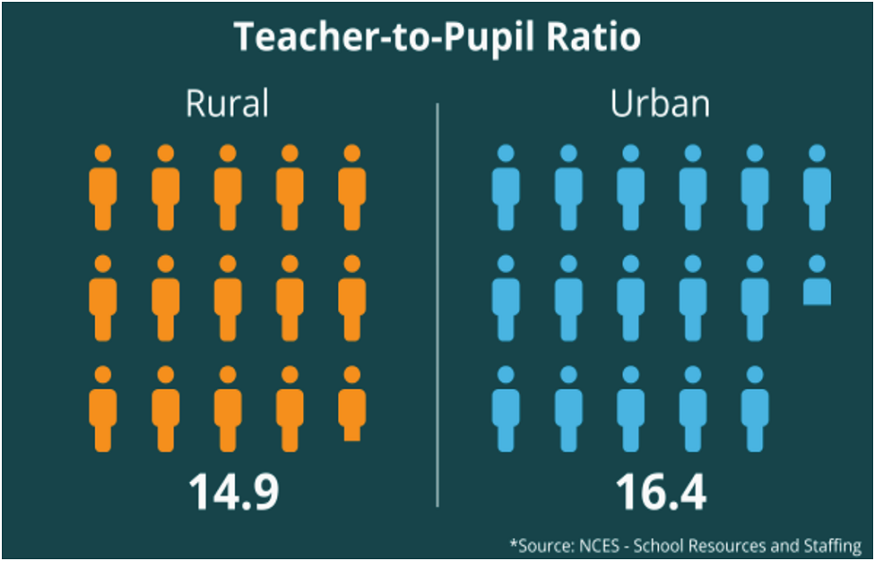Research reveals over 1.5 billion people worldwide are learning English, reflecting demand in big cities and remote towns.
As you can see, there is a rising demand for English teachers. But deciding where to teach English feels like choosing between two completely different worlds. It is easy to get confused between teaching English in rural vs. urban areas.
Would you choose the peaceful countryside with its small villages and slow pace? Or, would you prefer busy cities with bright lights and modern comforts? Both places need English teachers and offer different kinds of adventures. So, let’s look at both options to help you decide which fits you better.
Teaching English in Rural Areas: What to Expect
When you teach in rural areas, you often make a bigger difference. Students there might not have as many learning resources, which means your help matters even more.
Here are some good parts about teaching in rural areas:
-
Everyone Knows Everyone
In small towns, you quickly become part of the community. People welcome you with open arms and real curiosity.
-
True Culture
Living in a rural area means following traditions and customs that city life does not. You get to taste local foods and join in celebrations that have been happening for hundreds of years.
-
Fewer Students
With smaller classes, you can get to know each student better. You have time to help everyone and see how they grow and learn.
-
Peaceful and Quiet
If you do not like noise and traffic, rural life gives you calm days and star-filled nights. The pace of life is slower, giving you time to think and enjoy nature.
But here are some things to think about:
- The Internet can be slow or sometimes not work.
- There are not many places to go for fun.
- You might be the only person who speaks English.
Educators who have completed the TEFL Course in Bangalore understand that rural schools often have less number of teachers. This means people will value you a lot, but you might have to handle more work by yourself.
 Source:teachinglicense.study.com
Source:teachinglicense.study.com
Teaching English in Urban Areas: What to Expect
Teaching in cities means a different energy. Cities usually have better equipment and connections, which can make your daily life easier.
So, here are some good parts about teaching in urban areas:
-
Better Equipment
Most city schools have good internet, smart boards, and newer teaching tools. This makes planning and teaching lessons much simpler.
-
Growing Your Skills
Cities offer classes, meetups, and chances to learn new teaching methods. You will meet other teachers and be part of a bigger teaching community.
-
Different Types of Students
City classrooms often have students from many backgrounds. This brings interesting talks and helps everyone learn about various cultures.
-
More Money
Many city jobs pay better because living in cities costs more. You might also find extra work like tutoring after school.
But here are some things to think about:
- Classes can be a lot bigger and harder to control.
- Life moves fast and can be stressful.
- You might not have as much time with each student.
City students often have better access to computers and learning tools. While this helps your teaching, it also means people expect more from you.
Teaching English in Rural vs. Urban areas: Quick Comparison
When you compare teaching in rural and urban areas, you will notice some big differences:
- The rural areas typically have smaller, more personal classes while urban areas have larger, more diverse students.
- Countryside schools often have fewer teaching tools and resources, but cities usually offer plenty.
- In rural communities, you will likely feel more connected to a close and friendly group of people, while city life tends to be more independent.
- If you want career growth, cities offer more workshops and training chances, whereas rural areas might have fewer opportunities for the same.
- The internet connections might be spotty in the countryside but are usually reliable in cities.
So, What Should You Choose?
Ask yourself:
- Do you want life to move slowly or do you want each day filled with new things?
- Would you feel okay handling problems on your own, or would you rather have help nearby?
If you love nature and quiet times and want to really connect with a small group of students, then teaching in rural areas might feel better. People will look up to you, and you could change lives for years to come.
If you like structure, daily challenges, and being around other teachers, the city might fit you better. You will have access to better teaching tools, and you might find more ways to grow in your career.
Think about whether you prefer being alone sometimes or always having people around. Consider if you want to disconnect from technology and connect with nature, or if you enjoy having coffee shops, events, and new people nearby.
Where you teach shapes not just your work day, but your whole teaching experience.
Bottom Line
Both choices offer good things, and both will teach you lessons you didn’t expect. Teachers who have graduated from the 120 hour TEFL course in Bangalore agree that whether you teach under a tree in a quiet village or use the latest technology in a city school, your job stays the same – helping others open doors through language. The real question is: which door do you want to walk through?



